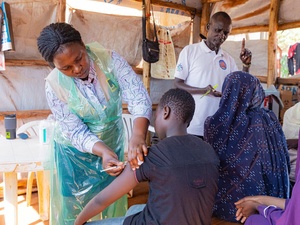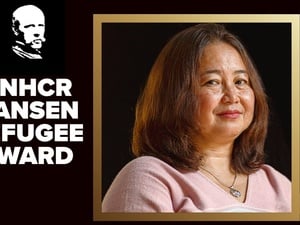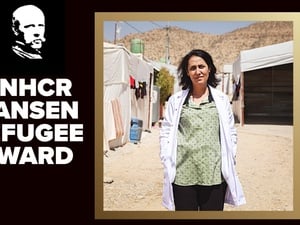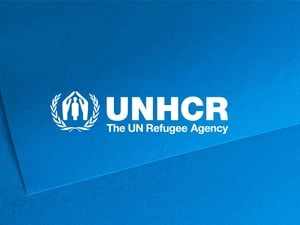Africa's refugees making progress in fight against HIV/AIDS
Africa's refugees making progress in fight against HIV/AIDS

Continued education and health care are crucial to keep HIV infection at bay among Angolan returnees, like these at Cazombo registration centre.
NAIROBI, June 7 (UNHCR) - Refugees in camps in Africa have made "dramatic" strides in changing their behaviour to reduce the risk of contracting and spreading HIV, the virus that causes the deadly disease AIDS, say UNHCR experts.
"Since we started proactively educating and sensitizing refugees, we have noted dramatic changes," Dr. Patterson Njogu, the UN refugee agency's expert on HIV/AIDS for East Africa and the Horn of Africa, told a Nairobi workshop of UNHCR technical experts on the disease, which is the leading cause of death in sub-Saharan Africa.
"The number of condoms being used in refugee camps has increased dramatically," Dr. Njogu said. "At one time you could not talk about condoms in the camps. Now condoms are very much in demand. There have also been changes in behaviour. The number of partners decreased significantly and transactional sex decreased as well."
He added that many refugees - as well as local people in their host communities - are coming for voluntary testing and counselling.
Statistics back up his observations. For example, in Kala camp in northern Zambia, home to 21,000 Congolese refugees, only 538 condoms were distributed in January 2003. By November of the same year, the figure had soared to almost 18,000 a month.
"When the refugees arrived in 1999 and 2000, condoms were kind of taboo, but we have just been extremely aggressive in education and distribution," said Laurie Bruns, UNHCR's regional HIV/AIDS technical officer for Southern Africa. "One big difference was that at first we only distributed condoms at health centres in the camp. Now we distribute them everywhere - in the markets, bars, at posts for food distribution."
Similarly, condom distribution in Kenya's Kakuma camp has risen more than six-fold - from 40 condoms per month per 1,000 refugees at the end of 2002, to about 250 a month now.
Despite the successes UNHCR and its partners - sister UN agencies like UNICEF, and non-governmental organisations - have had in educating refugees, there is still a need to devote much more money to the fight against HIV/AIDS in Africa, the UNHCR experts said.
Dr. Paul Spiegel, a Canadian physician and epidemiologist who heads the refugee agency's HIV/AIDS programmes, took pains to dispel the myth that refugees are responsible for spreading HIV/AIDS, saying this misconception causes double discrimination against people who have already been traumatized by displacement. "Refugees in many places are treated as pariahs," Dr. Spiegel said.
While it was true that refugees were at greater risk for HIV infection - because of rapes during conflicts, disrupted health care and the need sometimes to trade sex for food in flight - this did not in fact translate into higher infection rates.
"People made the leap from increased risk to increased infection, but this has not been the case," said Dr. Spiegel.
He cited a UNHCR study conducted among pregnant women in more than 20 African camps housing some 800,000 refugees. In five of the seven countries surveyed, refugees actually had a significantly lower HIV infection rate than the surrounding populations. In the other two, the rates were about equal.
In Kakuma camp in north-western Kenya, home to about 60,000 Sudanese refugees and 20,000 refugees from other countries, the infection rate in 2002 was found to be five percent, while in the surrounding area of Lodwar, Kenya, it was 18 percent.
Dr. Njogu said refugees made a convenient scapegoat for African governments and people in denial. "For many years, countries have denied the existence of AIDS in their community and have tended to blame people who are coming from outside - tourists, refugees, traders."
Ironically, chronic conflicts like those in Angola and south Sudan actually curbed the spread of HIV/AIDS. "It is counter-intuitive, but the data show that chronic conflicts in Sierra Leone, Angola and South Sudan actually kept HIV infections at a lower rate than otherwise would have happened," Dr. Spiegel said.
"In Sierra Leone and Angola, for example, you've lost the infrastructure," he explained. "There is decreased mobility. Truckers are not moving around, are not going to urban areas with higher HIV prevalence, sleeping with prostitutes and going back to infect their wives."
As peace comes to these regions and refugees begin to go home, the challenge for UNHCR and its partners will be to help refugees take home good habits they have learned in the camps, and to continue HIV/AIDS awareness and education as they reintegrate into their home countries.
"We want to make sure refugees don't aggravate the problem [in their countries of return] and in fact contribute to the solution," Dr. Spiegel said. In countries like Angola, this means working with other agencies to ensure that health care is available even in remote areas of return, and to train community health workers and nurses. In south Sudan, UNHCR plans to work together with the authorities to ensure that programmes are put in place to prevent HIV and AIDS - identified by refugees as one of their top two concerns (along with education) - when refugees begin returning to the region after decades in exile in surrounding countries.









